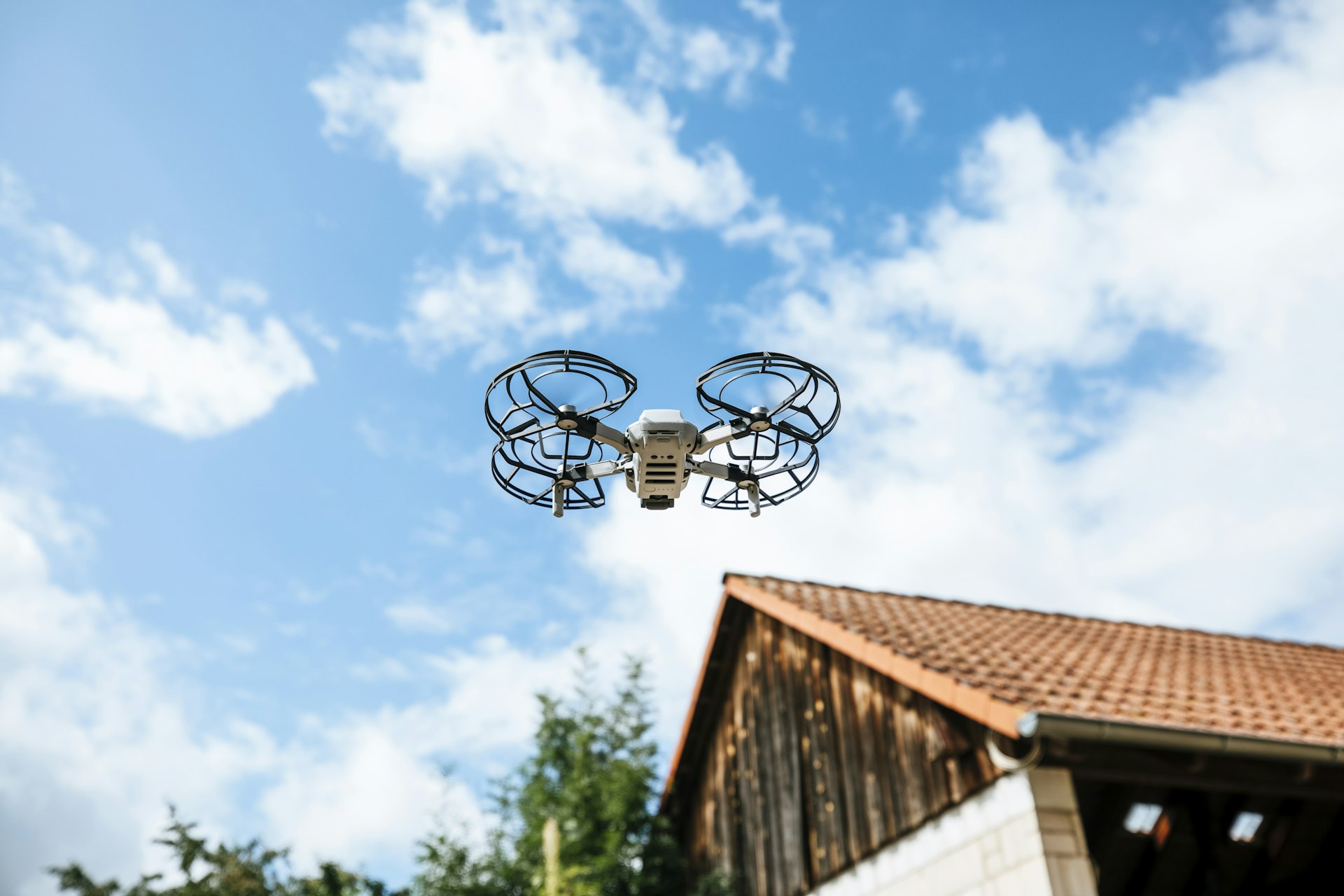How Drone Technology Is Transforming the Future of Real Estate Inspections


Photo by Markus Spiske on Unsplash
The Next Generation of Real Estate Inspections: Drones, AI, and Automation
The landscape of real estate inspections has fundamentally changed with the arrival of drone technology and advanced automation. What once demanded manual labor, significant risk, and time-consuming site visits can now be streamlined through aerial intelligence, smart sensors, and artificial intelligence (AI)-driven analytics. As the industry moves toward 2025 and beyond, these technologies are not just enhancing efficiency-they are redefining the entire due diligence process, boosting safety, and setting new standards in property evaluation and marketing. [1]
Why Drones? Key Advantages Over Traditional Inspections
Traditional inspection methods often come with limitations: incomplete ground-level views, costly aerial surveys, and risks to inspectors when accessing rooftops and other hazardous spots. Drones equipped with high-resolution cameras, thermal sensors, and LiDAR technology offer a superior solution by capturing comprehensive, objective visual data from virtually any angle. [1] [3]
Some of the most significant benefits include:
- Safety: Drones eliminate the need for inspectors to climb ladders or enter dangerous areas, reducing the risk of injury. [4]
- Efficiency: Aerial inspections can be performed in a fraction of the time, often with less disruption for property owners. [4]
- Accuracy: High-resolution imagery and 3D mapping enable more precise assessment of damage, wear, and structural conditions. [1]
- Cost Savings: By reducing the need for specialized equipment and personnel, drone-based inspections can lower operational costs by up to 50%. [3]
AI and Automation: Taking Drone Inspections to the Next Level
The future of property inspections is not just about deploying drones-it’s about leveraging AI and automation. By 2025, integrated ecosystems of drones, AI algorithms, and sensors will enable fully automated inspections. These systems will scan entire buildings, analyze data in real time, and produce comprehensive reports without human intervention. [2]
How It Works: AI-powered drones perform 360-degree scans using cameras and LiDAR sensors, capturing everything from roof integrity to energy efficiency data. The software then identifies structural issues, quantifies damage, and even forecasts property values-all with up to 99% accuracy. [3]
Practical Example: A property manager can schedule regular drone flyovers to monitor for roof leaks, HVAC malfunctions, or pest infestations. AI processes the data, flags anomalies, and generates actionable maintenance reports-saving time and reducing costly surprises. [2]
Marketing and Sales: Enhanced Visuals and Buyer Engagement
Drones are not only transforming inspections-they’re revolutionizing property marketing. Listings featuring drone videos and immersive 3D models have been shown to sell up to 68% faster, with buyer inquiries increasing by as much as 95%. [3]
Virtual tours created with drone footage provide remote buyers with a true sense of scale, layout, and location. Advanced AI tools can also generate interactive virtual staging and augmented-reality walkthroughs, further boosting engagement and property value.
Step-by-Step Guidance: How to Access Drone Inspection Services
If you are interested in implementing drone technology for real estate inspections, consider these actionable steps:
- Research Local Providers: Search for licensed drone inspection companies in your state. Use terms like “drone property inspections near me” or “UAV real estate inspection services.”
- Verify Credentials: Ask for FAA Part 107 certification for commercial drone operators. This ensures legal compliance and pilot expertise.
- Request Service Details: Inquire about the types of inspections offered (e.g., roof, exterior, interior), the sensors used, and turnaround times for reports.
- Compare Pricing: Pricing may vary based on property size, location, and the complexity of the inspection. Always request a detailed quote and clarify what is included.
- Review Example Reports: Ask providers for sample inspection reports or image galleries to evaluate the quality and thoroughness of their services.
- Contact Professionals: For more information or to discuss your specific needs, you can contact established drone inspection firms such as GeoWGS84 Corp at info@geowgs84.com or (720) 702-4849. [5]
If you are an organization seeking to build in-house capabilities, consider reaching out to industry associations, attending real estate technology conferences, or enrolling in drone pilot training programs. The Federal Aviation Administration (FAA) is the official regulatory agency for drone operations in the U.S.-search for “FAA drone rules for commercial use” on the FAA’s official website to review current requirements and updates.
Challenges and Solutions in Drone-Based Inspections
While drone inspections offer many advantages, some challenges remain:
- Regulatory Compliance: Commercial drone use is regulated. Ensure drones are operated by certified pilots and that flights comply with local airspace laws.
- Privacy Concerns: Always respect privacy boundaries and obtain necessary permissions when inspecting residential properties.
- Weather Dependency: Inclement weather can delay drone flights. Schedule inspections for optimal conditions when possible.
- Data Security: Protect client data by using secure platforms for image storage and report delivery.
To address these concerns, work only with reputable, licensed providers and follow all recommended best practices for data protection and regulatory compliance. Many organizations also choose to maintain cyber liability insurance to mitigate data risks.

Photo by Vlad Busuioc on Unsplash
Future Trends: What to Expect in the Coming Years
The evolution of drone technology in real estate inspections is ongoing. Key trends to watch include:
- Increased AI Integration: Advanced analytics will automate damage detection, compliance checks, and predictive maintenance, further reducing manual effort. [5]
- Autonomous Flight Plans: Drones will increasingly operate on pre-programmed paths, minimizing human error and maximizing consistency.
- Wider Adoption: As regulations evolve and costs decrease, expect broader adoption in sectors beyond real estate-such as insurance, construction, and environmental management. [5]
- Deeper Data Integration: Inspection data will be integrated with property management platforms and digital twins, enabling holistic asset management and proactive maintenance planning.
Alternatives and Complementary Approaches
While drones are at the forefront, other technologies such as ground-based robots and IoT sensors are also making headway in property inspections. For complex interiors or underground assessments, consider combining drone surveys with robotic crawlers or smart monitoring devices. This hybrid approach can provide a more complete view of a property’s condition, especially for large commercial sites. [2]
Key Takeaways
Drones, AI, and automation are rapidly becoming essential tools in real estate inspections. They deliver faster, safer, and more accurate assessments, reduce costs, and enhance marketing appeal. To get started, research local providers, verify certifications, and consult regulatory guidance from the FAA or your country’s civil aviation authority. As these technologies continue to evolve, staying informed and adaptable will ensure you remain competitive in a changing market.
References
- FlyGuys (2024). Using Drone Data to Improve Due Diligence in Commercial Real Estate and Insurance Planning.
- JaxonTexas (2024). Automated Property Inspections in 2025: The Future of Real Estate and Maintenance.
- HomeJab (2025). Top AI Drone Trends in Real Estate 2025.
- Household Rebate (2024). How Drones Are Changing the Way We View Real Estate.
- UAVSphere (2024). Drone Inspection Services: The Future of Efficient Property Inspections.






